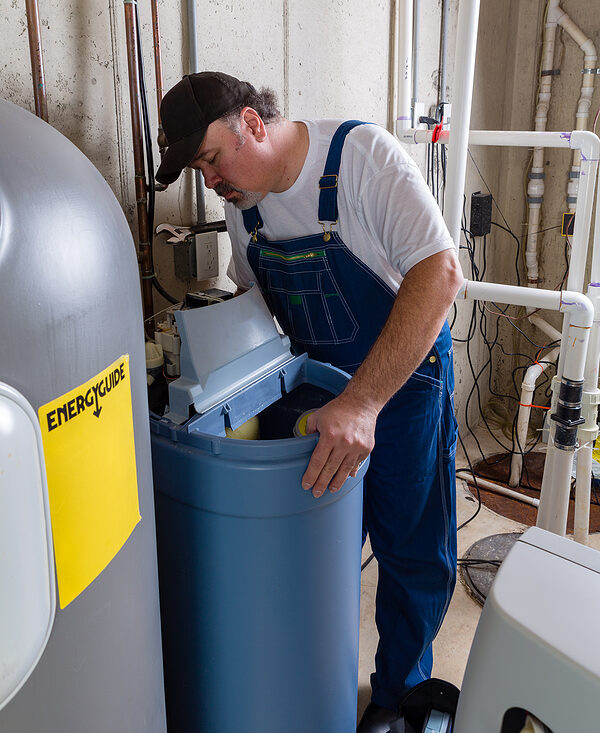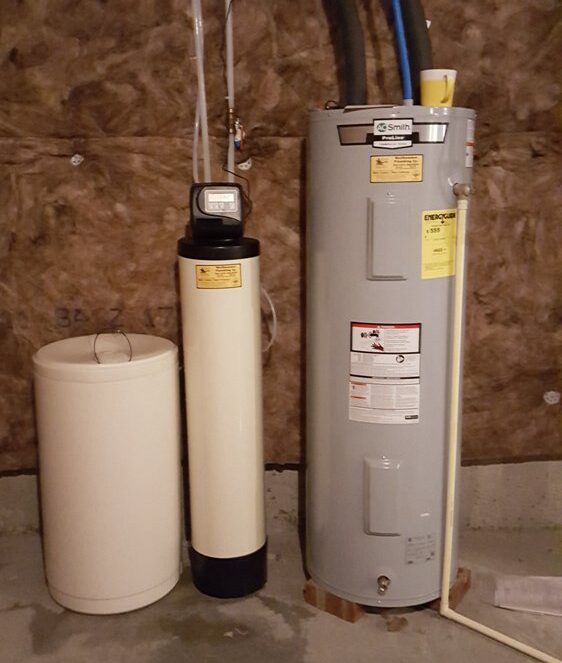Clean water flows from your tap, but it might be carrying minerals that slowly damage your home. This is the reality of hard water, a common issue for many homeowners, especially in Indiana. While it’s safe to drink, the high concentration of dissolved minerals like calcium and magnesium can have costly effects on your plumbing, appliances, and even your skin and hair. Understanding the problems hard water creates is the first step toward finding a lasting solution and protecting your investment.

Identifying the Signs of Hard Water
Hard water problems aren’t always obvious until damage has already occurred. Being able to spot the early warning signs can save you from expensive repairs and replacements down the line. If you notice any of these issues, it might be time for a hard water test.
What to Look For:
- Soap Scum and Film: Do you see a chalky white film on your shower doors, faucets, and dishes? That’s soap scum, which forms when soap reacts with the minerals in hard water.
- Mineral Stains: Stubborn, reddish-brown stains in your sinks, tubs, and toilets are often caused by iron deposits found in hard water.
- Dry Skin and Dull Hair: Minerals in hard water can strip your skin and hair of their natural oils, leading to dryness, irritation, and a dull, lifeless appearance.
- Faded or Stiff Laundry: Clothes washed in hard water can feel stiff and look faded because mineral deposits get trapped in the fabric.
- Reduced Water Flow: Is your showerhead sputtering? Mineral buildup can clog faucets and showerheads, leading to a noticeable drop in water pressure.
At-Home Hard Water Test:
To determine if you have hard water, there are a few simple tests that you can do at home.
Water and Soap Test:
- Wet your hands with water and add a small amount of soap.
- Rub your hands together to create a lather.
If the water is hard, you will notice that the soap does not easily dissolve and instead forms a scum or film on top.
The Glass Test:
- Fill a clear glass with tap water.
- Add a few drops of liquid dish soap and swirl the glass gently.
If the water turns cloudy or has visible particles floating in it, then it is likely hard water due to mineral buildup.
The Costly Effects of Hard Water on Appliances
Your home’s appliances are significant investments, and hard water can drastically shorten their lifespan. Water heaters, dishwashers, washing machines, and coffee makers are all vulnerable to hard water damage.
Inside these appliances, heat causes calcium and magnesium to form solid deposits known as limescale. This plumbing scale buildup forces appliances to work harder, consume more energy, and eventually fail. According to a study by the Water Quality Research Foundation, hard water can reduce the lifespan of appliances by up to 50%, potentially costing homeowners thousands of dollars in premature replacements (Batelle Memorial Institute).
Water heaters are particularly susceptible. Research indicates that a water heater can lose efficiency by 4% each year due to scale buildup. This mineral layer insulates the heating element, forcing it to use more energy to heat the water. Over time, this can increase energy consumption by up to 20%, adding a significant amount to your utility bills (Water Quality Research Foundation).
Schedule a Professional Water Softener Inspection ✅
How Hard Water Impacts Your Plumbing
The damage from hard water isn’t limited to what you can see. Over time, scale buildup silently accumulates inside your pipes, restricting water flow and reducing pressure throughout your home. This constriction puts a strain on your entire plumbing system.
In severe cases, the buildup can lead to complete blockages, requiring costly professional intervention. Plumbing repairs related to hard water scale can cost an average of $500 to $1,000 per incident. By addressing hard water problems early, you can prevent these expensive emergencies and maintain the efficiency of your plumbing.
The Effects of Hard Water on Skin and Hair
The impact of hard water extends to your personal care routine. The minerals in the water react with soaps and shampoos to form a film that doesn’t rinse away easily. This residue can clog pores, leading to acne and skin irritation, and can weigh down your hair, making it look dull and feel brittle.
For those with sensitive skin conditions like eczema or psoriasis, hard water can worsen symptoms by drying out the skin and disrupting its natural moisture barrier. Furthermore, households with hard water often spend more on personal care products. It’s estimated that these homes spend up to $150 more per year on soaps and detergents just to counteract the effects of the minerals.
Finding the Right Solution for Hard Water Removal
Fortunately, effective solutions are available to combat hard water problems and protect your home. The two primary methods are water softening and water conditioning.
Water Softeners
A water softener is the most common and effective method for hard water removal. This system works through a process called ion exchange, where it removes calcium and magnesium ions and replaces them with sodium ions.
The result is soft water that won’t create scale buildup, is gentle on your skin, and helps your appliances run efficiently. Professional water softener installation ensures the system is correctly sized for your home’s needs and integrates seamlessly with your existing plumbing.
Water Conditioning
An alternative to traditional softeners is water conditioning. These systems don’t remove the minerals but instead alter their chemical structure to prevent them from sticking to surfaces and forming scale. Water conditioners are a salt-free option that requires less maintenance, though their effectiveness can vary depending on the water chemistry in your area.
Choosing the right system depends on your specific needs, water hardness level, and budget. Consulting with a professional water softener company can help you determine the best solution for your Indiana home.
Final Thoughts
The evidence is clear: hard water can lead to a cascade of problems, from inefficient appliances and clogged pipes to dry skin and wasted money. By recognizing the signs and taking proactive steps, you can protect your home, extend the life of your appliances, and improve your quality of life. Investing in a water treatment system delivers soft water that saves you from costly repairs and daily frustrations.
If you’re experiencing hard water problems in Indiana, don’t wait for the damage to get worse. Contact Us Today for professional water softener installation or repair services and start enjoying the benefits of soft water.
Related Post: Winning the Battle Against Hard Water: Effective Tips and Techniques









